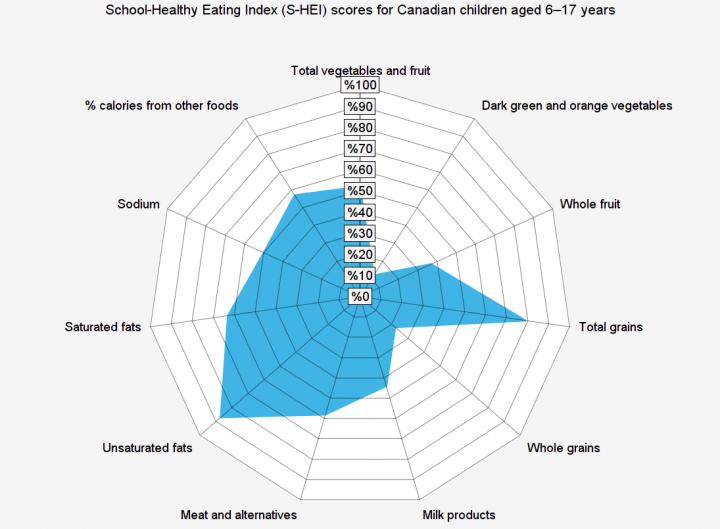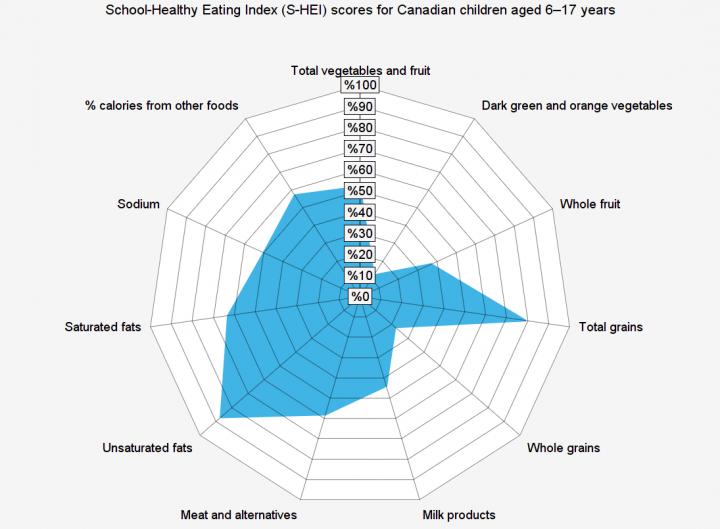
Credit: UBC Public Affairs / Claire Tugault-Lafleur
Canadian children don't eat enough vegetables, fruit and dairy products during school hours, causing them to fall short of several daily dietary recommendations on school days, a new UBC study has found.
"Before this study, nobody in Canada had looked at actual differences in dietary intake patterns between school hours and non-school hours," said lead author Claire Tugault-Lafleur, a PhD candidate in UBC's human nutrition program. "If we want to inform nutrition policies and dietary interventions for schools, we have to look not only at foods consumed at school, but also examine the contribution of these foods to a child's daily dietary intake. Very few people are looking at that."
According to the research published today in Applied Physiology, Nutrition and Metabolism, children consumed approximately one-third of their total daily calories during school hours, but intake of dairy products and key nutrients found in milk — calcium and vitamin D, for example — was lower during school hours compared to the rest of the school day. Meanwhile, intake of less nutritious foods like sugar-sweetened beverages, salty snacks and candies was relatively higher during school hours.
Researchers examined data from the 2004 Canadian Community Health Survey involving 4,827 children across Canada between the ages of six and 17. Respondents provided information about the food and beverages they consumed in the past 24 hours. The UBC study compared the nutritional profile of foods consumed during school hours (between 9 a.m. and 2 p.m.) with foods outside of school hours.
The researchers devised a School Healthy Eating Index (School-HEI), a score based on 11 key components of a healthy diet that examines the totality of foods and beverages consumed by Canadian children during school hours. The average score for of 53.4 points (out of a maximum of 100) for all Canadian children suggested substantial room for improvement.
The researchers also looked at sociodemographic information to examine whether any factors were associated with differences in diet quality among subgroups of children. They found that diet quality scores during school hours averaged nine points lower among children aged 14-17 compared to children aged 6-8. Children in Quebec, on average, scored at least five points higher than peers in Newfoundland and Labrador, Nova Scotia, Ontario and Manitoba. Children from families with post-secondary education had scores that averaged two points higher, enough to be statistically significant.
Tugault-Lafleur now looks forward to comparing the data with a new set collected during the 2015 Canada Community Healthy Survey and released in early August.
"To know what was happening in terms of baseline in 2004, and to be able to make comparisons over the last decade, seems really promising," she said. "I'd like to see if there are some places in the country where we see greater improvements in school-hour diet quality, and whether different initiatives or school nutrition policies were implemented in these regions from 2004 to 2015."
###
Assistant Professor Jennifer Black and Professor Emeritus Susan Barr of UBC's Department of Food, Nutrition and Health in the Faculty of Land and Food Systems oversaw Tugault-Lafleur's research and co-authored the study.
Media Contact
Erik Rolfsen
[email protected]
604-822-2644
@UBCnews
http://www.ubc.ca
Original Source
http://www.nrcresearchpress.com/doi/abs/10.1139/apnm-2017-0125 http://dx.doi.org/10.1139/apnm-2017-0125





